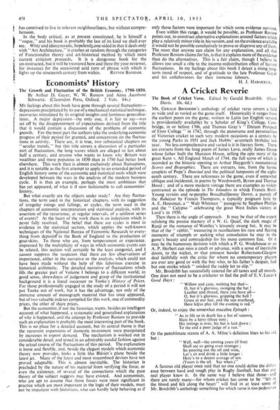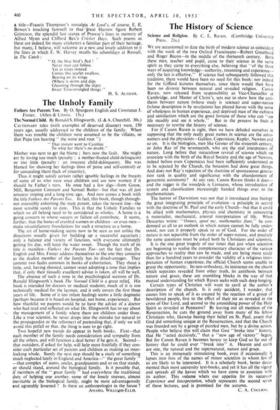A Cricket Reverie
The Book of Cricket Verse. Edited by Gerald Brodribb. (Hart- Davis. 10s. 6d.) MR. GERALD BRODRIBB's anthology of cricket verse covers a field as wide and as varied as the game itself. Historically it ranges from the earliest poem on the game, written in Latin (an English version is providentially available) by a Scholar of King's College, Cam- bridge, in or before 1706, and Thomas Gray's " Distant Prospect of Eton College " in 1742, through the panorama and personalities of Victorian cricket to such very modern occasions as a century by the young Parks in 1951 and Jack Hobbs' seventieth birthday last year. No less comprehensive and varied is it in literary form. There are extracts from the long poem of James Love, really James Dance whose father built the Mansion House, telling the epic story of the great Kent v. All England Match of 1744, the full score of which is recorded as the historic opening to Arthur Haygarth's monumental Scores and Biographies. There are extracts, too, from the heroic couplets of Pope's Dunciad and the political lampoons of the eight- eenth century. There are references to the game, even if somewhat oblique and incidental, in poems by Wordsworth, Byron and Thomas Hood ; and of a more modern vintage there are examples as widely contrasted as the episode in The Islanders in which Francis Brett- Young revisits and re-peoples Broadhalfpenny Down, a parody of the Rubaiyat by Francis Thompson, a typically poignant lyric by A. E. Housman, a " Walt Whitman " panegyric by Stephen Phillips and the " Calypso " celebrating the great West Indies victory at Lord's in 1950.
Then there is the angle of approach. It may be that of the expert relishing the precise mastery of a W. G. Quaif; -the dark magic of Ranji or the romance of Woolley's leisurely swung bat. It may be that of the " rabbit," treasuring in recollection his rare and fleeting moments of triumph or seeking what consolation he may in the game's beauty and comradeship for his more common fate. Or it 'may be the humorous derision with which a P. G. Wodehouse or an A. P. Herbert can miss a catch or advance, with a sense of inevitable doom, to the wicket, or that eminent bowler Robertson-Glasgow deal faithfully with the critic for whom no contemporary players are ever any good or with the boy who, to his father's despair, had but one stroke which " snicked the ruddy lot to slip."
Mr. Brodribb has successfully catered for all tastes and all moods. One does not need to be a cricketer to feel the pull of E. V. Lucas's Good Days : " Willow and cane, nothing but that=--
0, but it's glorious, swinging the bat ! Leather and thread, there you have all- 0, but it's glorious, gripping the ball ! - Grass at our feet, and the sun overhead, Here let/us play till the evening is. red."
Or, indeed, to enjoy the somewhat macabre Epitaph : " As in life so in death lies a bat of renown, Slain by a lorry (three ton) ;
His innings is over, his bat is laid down : To the end a poor judge of a run."
Or the penultimate stanza of A. A. Milne's delicious lines to his old bat :
" Well, well—the coming years (if fine) Shall see us going even stronger ; So pouring out the oil and wine, Let's sit and drink a little longer : Here's to a decent average of ten.
(Yours is the oil. Say when.)"
A famous old player once said that no one could define the dift-er- ence between hard and rough play in Rugby football, but that any real player knew it. In the same way I believe that those—and there are surely many—for whom cricket has come to be "felt in the blood and -felt along the heart" will find in at least some of Mr. Brodribb's anthology something for which verse is too pedestrian a title—Francis Thompson's nostalgia At Lord's, of course, E. E. Bowen's touching farewell to that great Harrow figure Robert Grimston, the splendid last stanza of Prowse's lines in memory of Alfred Mynn and Clifford Bax!s Cricket Days. Such poems as these are indeed for many cricketers a familiar part of their heritage, but many, I believe, will welcome as a new and lovely addition to it the lines in which F. W. Harvey recalls his schooldays at Rossall, in The Catch : " 0, the blue bird's fled ! • Never man can follow. Yet at times instead Comes this scarlet swallow, Bearing on its wings (Where it skims and dips Gleaming through the slips)- Sweet Time-strangled things." H. S. ALTHAM.



































 Previous page
Previous page